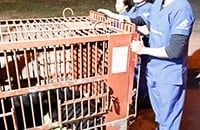Elephants playing polo at “conservation” event sends all the wrong messages
24 March 2017
They can call it sport, charity or even conservation but it’s just another cruel circus with animals controlled by bullhooks for human entertainment.
By Dave Neale, Animals Asia Animal Welfare Director
Earlier this month, Bangkok hosted the annual King’s Cup, an elephant polo competition with the publicly stated aim of raising money for conservation.
Such an unusual sight attracts wealthy spectators and the media is quick to cover the event and highlight the funds raised for the conservation of wild elephants.
But why would any one find it necessary for these animals to perform before we will drop a penny in the tin to save their still-wild peers? And when we talk about conservation and of saving animals – who exactly are we saving from them from, if not this awful spectacle?
The elephants unwillingly taking part in the games are working elephants. When not entertaining the rich at polo, they are ferrying tourists around sites in Thailand or dragging fallen trees at logging camps.
The organisers praise how well they treat the 30 participating elephants, citing the fruit, vegetables and massages the animals receive – and make the whole sorry show start to sound like a well-deserved holiday from their day job.
But we must never lose sight of the fact that these animals were not born to perform. They have no desire to play polo nor carry tourists.
The fact that spectators write a cheque to a conservation society after being entertained by a majestic animal forced to do dangerous and unnatural tricks, does not alter the fact that this is simply another form of exploitation.
It also perpetuates public perception that elephants are performing animals. It makes it that much harder to explain why elephant rides for tourists are not acceptable. It makes it more difficult to convince circuses to end elephant performances, and it sends the wrong message to society and our children.
The elephants forced to play polo each year are still controlled with bullhooks – a sharpened metal hook jabbed into the skin. No matter how gently the bullhook may be used with an animal in the arena, at some point it had to be established as a negative reinforcer to be effective. That means causing enough pain and discomfort that the animal remembers, and seeks to avoid that experience from ever happening again – even if it means chasing a tiny ball around a field.
When the entertainment stops and the philanthropists return to their hotels or nice homes feeling good about how they’ve helped save wild elephant populations, the unhappy elephants will be put back in chains.
These social animals naturally live in close, stable groups of an extended family of females. When chained that is all taken from them. Any social interaction is limited causing stress over long periods of time which is likely to result in behavioural abnormalities.
Like the audience at a circus, many don’t realise the elephants entertaining them are actually chronically stressed. Elephants often don’t show overt signs of distress. Their terror is internalised and the show goes on.
Do we really believe the argument put forward by the organisers that the elephants playing polo each year are in good health and enjoying this chance to exercise? Is this spectacle a happy holiday from their day job?
Elephants forced to work in camps generally have poor welfare, but taking an individual out of one stressful environment and placing it into another does not lead to better welfare.
Is this the price elephants must pay for our concern? Must they entertain us before we deem them worthy of saving or deserving of a natural habitat?
The answer must emphatically be no. Not for me.
BACK





 5 reasons the dog meat trade must end
5 reasons the dog meat trade must end
 New year, new home for Christmas the Bear!
New year, new home for Christmas the Bear!
 Veterinary welfare training – pain management
Veterinary welfare training – pain management